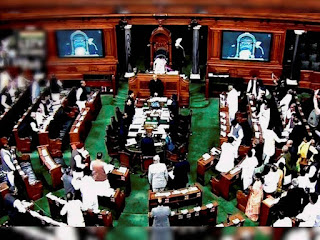Decoding the Functionality and Basics of India's Lok Sabha: A Comprehensive Guide
The Lok Sabha, also known as the House of the People, is the lower house of the Indian Parliament. It is the principal legislative body in India and is responsible for passing laws and making decisions on behalf of the Indian people.
The Lok Sabha is composed of elected members who represent the people of India. These members are elected through a direct vote in general elections held every five years. The Lok Sabha currently has 543 seats, with each seat representing a different geographic constituency. The number of seats allocated to each state is determined by the population of the state, with larger states having more seats than smaller states.
The Lok Sabha is led by the Speaker of the Lok Sabha, who is elected by the members of the Lok Sabha. The Speaker is responsible for maintaining order in the Lok Sabha and ensuring that the rules and procedures of the Lok Sabha are followed. The Lok Sabha also has a Deputy Speaker who assists the Speaker in his duties.
The Lok Sabha conducts its business in sessions, which are typically held twice a year. The first session is held from January to April and the second session is held from July to August. During these sessions, the Lok Sabha conducts debates on various issues, passes bills and makes decisions on behalf of the people of India.
The Lok Sabha also has several committees that are responsible for specific areas of policy. These committees include the Public Accounts Committee, the Estimates Committee and the Committee on Public Undertakings. These committees are responsible for examining the accounts of the government, making recommendations for the budget and conducting investigations into the operations of government departments.
The Lok Sabha also has the power to remove the Prime Minister and other members of the Council of Ministers from office through a vote of no confidence. A vote of no confidence is a vote by the Lok Sabha to express its lack of confidence in the ability of the Prime Minister and the Council of Ministers to govern. If a majority of the members of the Lok Sabha vote in favor of a motion of no confidence, the Prime Minister and the Council of Ministers are required to resign.
The Lok Sabha also plays an important role in the impeachment process of the President of India. The Lok Sabha can initiate impeachment proceedings against the President if a notice of impeachment is given by at least one-fourth of the total members of the Lok Sabha. The notice must then be passed by a majority of the total members of the Lok Sabha.
In addition to its legislative responsibilities, the Lok Sabha also plays an important role in the oversight of the Executive branch of government. The Lok Sabha has the power to ask questions of the Prime Minister and other members of the Council of Ministers, and can also summon them to appear before the Lok Sabha to answer questions.
The Lok Sabha is an important institution in the Indian political system and plays a vital role in the functioning of Indian democracy. It represents the people of India and is responsible for making laws and decisions on their behalf. The Lok Sabha is also responsible for holding the Executive branch of government accountable to the people of India.
In conclusion, the Lok Sabha is one of the two chambers of the Indian parliament, responsible for making laws and decisions on behalf of the Indian people. It is composed of elected members from different geographic constituencies and is led by a speaker. It conducts its business in sessions and has several committees responsible for specific areas of policy. The Lok Sabha also plays an important role in the impeachment process of the President of India and in the oversight of the Executive branch of government. It serves as a check and balance on the government and ensures that the government is held accountable to the people of India.




0 Comments